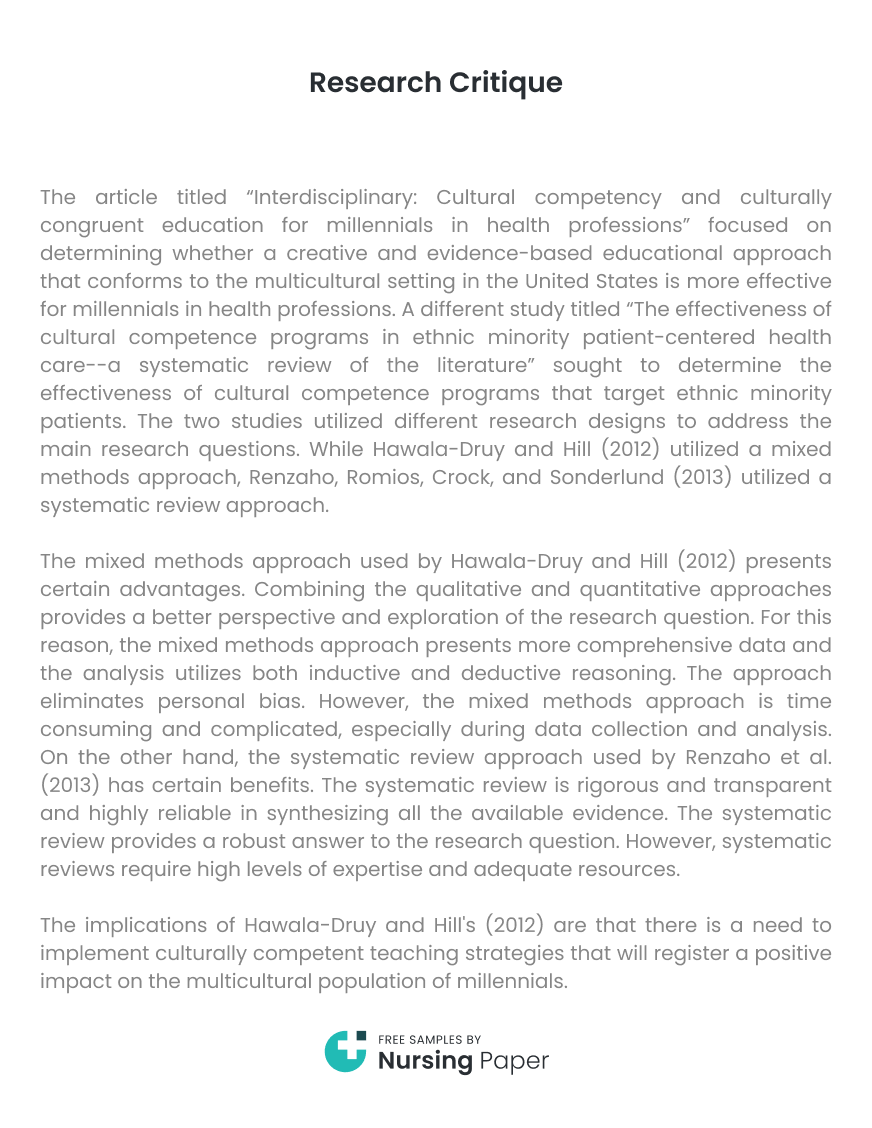
Research Critique
Introduction
The article titled “Interdisciplinary: Cultural competency and culturally congruent education for millennials in health professions” focused on determining whether a creative and evidence-based educational approach that conforms to the multicultural setting in the United States is more effective for millennials in health professions. A different study titled “The effectiveness of cultural competence programs in ethnic minority patient-centered health care–a systematic review of the literature” sought to determine the effectiveness of cultural competence programs that target ethnic minority patients. The two studies utilized different research designs to address the main research questions. While Hawala-Druy and Hill (2012) utilized a mixed methods approach, Renzaho, Romios, Crock, and Sonderlund (2013) utilized a systematic review approach.
The mixed methods approach used by Hawala-Druy and Hill (2012) presents certain advantages. Combining the qualitative and quantitative approaches provides a better perspective and exploration of the research question. For this reason, the mixed methods approach presents more comprehensive data and the analysis utilizes both inductive and deductive reasoning. The approach eliminates personal bias. However, the mixed methods approach is time consuming and complicated, especially during data collection and analysis. On the other hand, the systematic review approach used by Renzaho et al. (2013) has certain benefits. The systematic review is rigorous and transparent and highly reliable in synthesizing all the available evidence. The systematic review provides a robust answer to the research question. However, systematic reviews require high levels of expertise and adequate resources.


The implications of Hawala-Druy and Hill’s (2012) are that there is a need to implement culturally competent teaching strategies that will register a positive impact on the multicultural population of millennials. The study findings call for the development of a culturally competent curriculum and approach that will be more effective for millennials. On the other hand, Renzaho’s et al. (2013) has specific implications on the appropriateness of patient-centered care models. Based on the study findings, there is a need to implement patient-centered care models in healthcare delivery because they have the capacity to increase positive health outcomes among a culturally diverse population. The systematic review conducted by Renzaho et al. (2013) presented the best evidence for the intervention because it relied on numerous studies that tackled the research question. The evidence form the systematic review was from 11 quantitative studies and 2 qualitative studies that met the inclusion criteria. Therefore, Renzaho et al. (2013) gathered reliable evidence from numerous studies that explored the same topic. With such evidence from different studies, it is appropriate to recommend the intervention as having positive outcomes. The mixed methods study only relied on evidence from the data collected by the researchers which is inadequate evidence to support an intervention. It is explicit that the authors who explored evidence from different studies were in a better position to recommend the intervention.
A researcher seeking to conduct a study on the topic would need to improve the methods used. For Renzaho’s et al. (2013) study, it would be imperative to include more studies in the systematic review to diversify or deepen the evidence from different studies. On the other hand, Hawala-Druy and Hill’s (2012) study would require more participants for the quantitative approach. The scholars used 106 participants that seem inadequate for the quantitative approach. A larger sample is necessary to increase the generalizability of the findings. These improvements would make the study findings more valid.
1. Hawala-Druy, S., & Hill, M. H. (2012). Interdisciplinary: Cultural competency and culturally congruent education for millennials in health professions. Nurse Education Today, 32(7), 772–778. https://doi.org/10.1016/j.nedt.2012.05.002
2. Renzaho, A. M. N., Romios, P., Crock, C., & Sonderlund, A. L. (2013). The effectiveness of cultural competence programs in ethnic minority patient-centered health care–a systematic review of the literature. International Journal for Quality in Health Care, 25(3), 261–269. https://doi.org/10.1093/intqhc/mzt006



The download will start shortly.

The download will start shortly.
 Subject:
Health and Social Care
Subject:
Health and Social Care  Number of pages: 9
Number of pages: 9  Subject:
Health and Social Care
Subject:
Health and Social Care  Number of pages: 6
Number of pages: 6  Subject:
Health and Social Care
Subject:
Health and Social Care  Number of pages: 3
Number of pages: 3  Subject:
Health and Social Care
Subject:
Health and Social Care  Number of pages: 2
Number of pages: 2  Subject:
Medicine
Subject:
Medicine  Number of pages: 7
Number of pages: 7  Subject:
Medicine
Subject:
Medicine  Number of pages: 2
Number of pages: 2  Subject:
Health and Social Care
Subject:
Health and Social Care  Number of pages: 2
Number of pages: 2  Subject:
Nursing
Subject:
Nursing  Number of pages: 6
Number of pages: 6  Subject:
Nursing
Subject:
Nursing  Number of pages: 22
Number of pages: 22  Subject:
Nursing
Subject:
Nursing  Number of pages: 3
Number of pages: 3  Subject:
Nursing
Subject:
Nursing  Number of pages: 8
Number of pages: 8  Subject:
Medicine
Subject:
Medicine  Number of pages: 7
Number of pages: 7  Subject:
Health and Social Care
Subject:
Health and Social Care  Number of pages: 2
Number of pages: 2  Subject:
Health and Social Care
Subject:
Health and Social Care  Number of pages: 3
Number of pages: 3  Subject:
Medicine
Subject:
Medicine  Number of pages: 17
Number of pages: 17 
